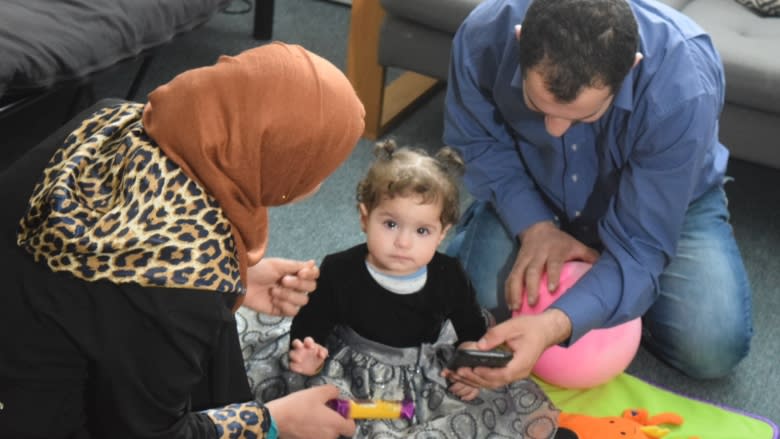'We're actually making a difference': Young adults help Syrian mothers learn English
In a basement apartment on a short road off Prospect Street in Fredericton, one-year-old Janan Al Jassem sits on her mother's lap.
While she's clearly the focal point of the family, with toys tucked away beneath almost every surface, raising her and learning English simultaneously is a challenge for her mother, a Syrian newcomer.
"I didn't learn the language back home," Maysaa Al Salloum said through an interpreter. "I have trouble with grammar, vowels, stuff like that."
- Syrian youth in New Brunswick cities struggle to make friends
- Syrian bike mechanic hooks up Saint Johners with free rides
When she and her husband, Fayad Al Jassem, moved to the capital city and started learning English at the Multicultural Association of Fredericton, Al Salloum often stayed behind to look after their child.
As a result, the 19-year-old mother wasn't learning as fast as others in the new Syrian community.
"If I go out, I only know keywords to indicate what I want," she said.
Looking out for her daughter, she found herself isolated.
Student sees solution
In September of 2016, Sarah Alston began working with the Multicultural Association of Fredericton.
The Saint John native realized Al Salloum's problem wasn't unique.
"Most women don't get to go to English class because they have small children," she said. "Culturally, women are expected to stay home and take care of the kids."
"So if we provide the service where they could actually bring their kids, it takes a load off of them," she said.
"They can really focus on learning."
While a daycare service is provided by the association, it's typically full, Alston said.
So every Sunday, Alston and a group of her friends host private English lessons for the mothers at the Saint Andrew's Presbyterian Church in downtown Fredericton.
Community blossoms
Although the service began with just Alston, the mother and Google Translate, the project now has two bilingual instructors, as many as eight Syrian mothers and their children, and seven of Alston's friends who help tutor and act as babysitters.
It's grown into a small community and has become a chance for the women to see their friends.
"That's another thing," said the University of New Brunswick student. "When they come here, they don't know anybody. They can't speak the language. They need somewhere where they can create a social group."
"People who will have their back if they need someone. And they do."
Al Salloum said the class has been a great help.
"I feel comfortable speaking English with the other women," she said through an interpreter. "When we go to school, we listen to the instructor and write in English. We don't get to communicate much in other languages."
"It's helped a lot," she said.
It was two weeks ago when Alston realized it really was working.
"I realized we didn't use Google Translate once," she said, laughing.
"We had a whole hour-long conversation, we were laughing, making jokes with each other. It flowed so naturally. That's when I realized, 'Wow, this is working. We're actually making a difference.'"



